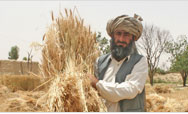USAID Responds to Global Food Crisis
BACKGROUND
At present, 37 countries throughout every region of the world are experiencing localized food insecurity, lack of access to food, or shortfalls in food production or supplies. In the past year, global food prices have increased an average of 43 percent, according to the International Monetary Fund. On April 14, the World Bank estimated that the doubling of food prices during the past three years could potentially push 100 million people throughout the world into extreme poverty.
Approximately 1 billion people—or nearly one-sixth of the world’s population—subsist on less than $1 per day. Of this population, 162 million survive on less than $0.50 per day. At the household level, increasing food prices have the greatest effect on poor and food-insecure populations, who spend 50 to 60 percent or more of their income on food, according to the International Food Policy Research Institute. Overall, increased food prices particularly affect the poorest people within developing countries. Among the populations affected by current food insecurity and price increase are people in Haiti and Tajikistan.
Global Food Insecurity and Price Increase Updates
07/01/08: Food Insecurity Update #4 (pdf, 82kb)
| NUMBERS AT A GLANCE* | SOURCE |
|---|
| Worldwide Population Subsisting on Less Than $0.50/day | 162 million | IFPRI – 2007 |
| Worldwide Population Subsisting on Less Than $1.00/day | Approximately 1 billion | IFPRI – 2007 |
HUMANITARIAN FUNDING PROVIDED IN FY 2008
USAID FUNDING COMMITTED TO ADDRESS FOOD INSECURITY AND PRICE INCREASE
USAID Food and Related Assistance Worldwide in FY 2007: $1,620,422,634
USAID Food and Related Assistance Worldwide to Date in FY 2008: $1,475,127,549
Additional USG Funding Announced on April 14, 2008: $200,000,000
Additional USG Funding Requested on May 1, 2008: $770,000,000
CURRENT SITUATION
HIGH LEVEL U.N. CONFERENCE ON WORLD FOOD SECURITY
The U.S. Department of Agriculture Secretary Ed Schafer and USAID Administrator Henrietta H. Fore led the U.S. delegation to the High Level U.N. Conference on World Food Security: the Challenges of Climate Change and Bioenergy, hosted by the U.N. Food and Agriculture Organization in Rome from June 3 to 5. During the conference, the U.S. delegation participated in a number of bilateral and multilateral meetings, reaffirming the U.S. commitment to combat global food insecurity: An immediate and expanded humanitarian response that will target those countries most vulnerable to hunger as a result of rising food costs and measures to increase the future availability of key food staple commodities in targeted partner countries.
SECURITY IMPACT OF THE GLOBAL FOOD SHORTAGE
On June 9, the Overseas Security Advisory Council (OSAC) released a report underscoring the potential longer-term security ramifications from the current global food shortage. The World Bank has identified 33 countries, many of which are already politically unstable, that are vulnerable to social unrest. The map below is compiled from various public media reports and highlights the broad geographic range of countries that have experienced food-related riots and/or protests since January 2007. According to OSAC, the longer-term impact of the crisis may include an increase in families facing poverty, a spread of “food refugees” as populations move to seek food security, increased criminal activities, and inflationary costs in food importing countries as governments increasingly subsidize food inputs.
Back to Top ^
|


